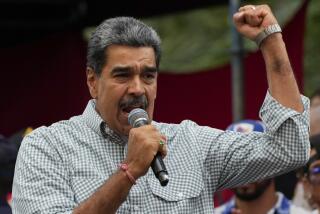U.S. intelligence warns of Venezuela collapse
- Share via
Reporting from Washington — With dire shortages of basic goods, a looming foreign debt payment, horrific street crime and intransigent political divisions, Venezuela is in danger of collapsing into waves of deadly violence, U.S. intelligence officials warned Friday.
Venezuela, which controls the world’s largest reserves of crude oil, is in the throes of a potentially explosive political stalemate after opposition parties gained a majority in the national congress in elections late last year.
President Nicolas Maduro, a leftist, faces a possible recall vote sponsored by the opposition that he is maneuvering to block.
All portends a dilemma for U.S. policymakers concerned about the ripples of more violence, but with few options to change the course of events.
See more of our top stories on Facebook >>
“The goal now is to mitigate the crisis that is unfolding,” a senior U.S. intelligence official said Friday, briefing a small group of reporters on condition of anonymity to discuss internal assessments. “You can hear the ice cracking.”
The Obama administration has slapped sanctions on a number of Venezuelan individuals linked to human rights abuses, and the Senate last month voted to extend the sanctions, which include denial of visas, until 2019.
Under the sanctions, the Treasury Department also can move to seize some Venezuelan assets in the U.S.
But Washington has little direct influence in the country, which has been ruled by anti-American socialists since the late Hugo Chavez came to power in 1999.
Maduro, a former bus driver and Chavez’s hand-picked successor, was elected to a six-year term in 2013, a month after the more charismatic Chavez died.
“The more the U.S. intervenes,” the U.S. official said, “the more we are seen as the problem.”
Recent polls have shown Maduro’s approval ratings have dropped as low as 15%, with a majority of Venezuelans blaming him for the country’s crisis and wanting to see his term truncated.
But the opposition has shown itself to be fragmented and unable to agree on a single strategy to oust the Maduro administration.
In addition to the recall movement, street protests spurred by both political and economic anger have besieged the Maduro government, which sent state security forces into neighborhoods this week to put down demonstrations.
Venezuela’s heavily armed population staggers under the world’s highest inflation rate. Maduro may also be worried about potential threats within his own inner circle and in the military, as the country deteriorates.
There has been widespread concern in the international finance world that Venezuela would fail to pay $6.85 billion in debt service over the last half of the year, sending the country of 30 million people into default.
However, the Eurasia consulting group said in an analysis this week that it appears the government in Caracas has preferred to continue slashing imports to service the debt.
At its current rate, Eurasia said, imports this year could total $21 billion, down from a high of $65 billion in 2012. That policy has consequences because fewer imports means fewer consumer goods for people who already can’t find toilet paper or car parts.
The Venezuelan government recently ordered four-day work weeks and rolling blackouts because of the scarcity of electricity.
“If you don’t have electricity, you don’t have water, it’s very difficult,” David Smilde, an expert on Venezuela at Tulane University, said at a recent forum sponsored by the Washington Office on Latin America, a non-governmental organization that promotes human rights.
“The economic numbers are awful. ... This could lead to a real crisis of governance,” he added.
Maduro is hoping to delay any recall vote until after January, when he will have completed half his term. Under Venezuelan law, he then could hand power to his vice president and not hold a snap election, and thus continue to wield power.
But political polarization, poverty and anger may explode before that. U.S. officials said such pressures could prove destabilizing in the region.
“It is hard to see how this ends ... without a more profound crisis,” another U.S. intelligence official said.
MORE FROM WORLD
Spain evacuates 9,000 from massive tire fire near Madrid
Puerto Rico announces its first Zika-related microcephaly case
In post-impeachment Brazil, the new conservative Cabinet is 100% white men
For more on international affairs, follow @TracyKWilkinson on Twitter.
More to Read
Sign up for Essential California
The most important California stories and recommendations in your inbox every morning.
You may occasionally receive promotional content from the Los Angeles Times.











